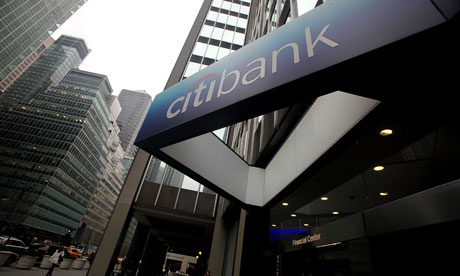
Citigroup's third quarter profits exceeded expectations. Photograph: Mario Tama/Getty Images
Citigroup has continued its bounce back from near death announcing its seventh consecutive quarterly profit.
The bank made a third-quarter profit of $3.74bn (£2.37bn), up 74% from a year earlier, boosted by an accounting adjustment, a reduction in losses associated with bad loans and strength in its international operations.
The results benefited from a $1.9bn gain tied to a change in the valuation of Citi's debt but even without the accounting boost Citigroup exceeded analysts' expectations.
The bank's revenue fell 8% from a year earlier to $18.9bn dragged down by a slump in investment banking and trading, a business that suffered at all major Wall Street banks.
Citi chief executive Vikram Pandit said: "Citi continues to navigate a challenging economic environment and delivered another quarter of solid operating results."
Once the US's largest financial services firm, Citi had to be bailed out by the US taxpayer three years ago after racking up record losses on sub-prime loans and other toxic debts. Pandit has been streamlining the firm while returning it to profitability.
He had planned to sell the firm's private label credit-card business, which runs credit cards for Sears, Home Depot and others, but said he now plans to keep the business, which has traditionally suffered higher defaults than other credit card units.
"The portfolio not only fits the current credit environment but also our strategy of building and strengthening relationships with our corporate clients," Pandit said.
The bank's results follow similar results from JP Morgan last week, which announced revenue at its investment-banking unit had fallen 13% from the second quarter, hampered by a slow down in business amid the eurozone crisis and the row in Washington over raising the debt ceiling.
Wells Fargo, the US's fourth largest bank, also announced third-quarter earnings on Monday up 21% as the bank benefited from lower credit-loss provisions. In the latest quarter, Well Fargo's provision for credit losses fell to $1.81bn from $3.44bn.
The bank made a third-quarter profit of $3.74bn (£2.37bn), up 74% from a year earlier, boosted by an accounting adjustment, a reduction in losses associated with bad loans and strength in its international operations.
The results benefited from a $1.9bn gain tied to a change in the valuation of Citi's debt but even without the accounting boost Citigroup exceeded analysts' expectations.
The bank's revenue fell 8% from a year earlier to $18.9bn dragged down by a slump in investment banking and trading, a business that suffered at all major Wall Street banks.
Citi chief executive Vikram Pandit said: "Citi continues to navigate a challenging economic environment and delivered another quarter of solid operating results."
Once the US's largest financial services firm, Citi had to be bailed out by the US taxpayer three years ago after racking up record losses on sub-prime loans and other toxic debts. Pandit has been streamlining the firm while returning it to profitability.
He had planned to sell the firm's private label credit-card business, which runs credit cards for Sears, Home Depot and others, but said he now plans to keep the business, which has traditionally suffered higher defaults than other credit card units.
"The portfolio not only fits the current credit environment but also our strategy of building and strengthening relationships with our corporate clients," Pandit said.
The bank's results follow similar results from JP Morgan last week, which announced revenue at its investment-banking unit had fallen 13% from the second quarter, hampered by a slow down in business amid the eurozone crisis and the row in Washington over raising the debt ceiling.
Wells Fargo, the US's fourth largest bank, also announced third-quarter earnings on Monday up 21% as the bank benefited from lower credit-loss provisions. In the latest quarter, Well Fargo's provision for credit losses fell to $1.81bn from $3.44bn.
No comments:
Post a Comment